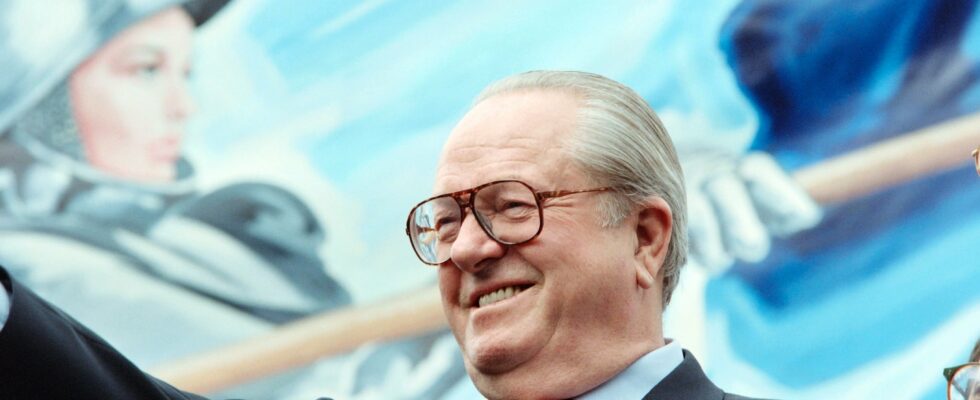Does death signal the end of passion? For a long time, Jean-Marie Le Pen was always the devil. For him, a fanatical aversion. “Fascist,” his detractors called him. It must be said that the person concerned was able to maintain his dark legend with a certain assiduity. Anti-Semitic remarks, racist remarks, apologias for war crimes: the worst is often the enemy of the Good. In 2012, when the late Philippe Cohen and Pierre Péan published 550 pages full of unpublished testimonies on the former president of the National Front, they claimed a dispassionate approach. After all, Jean-Marie Le Pen, his five presidential candidacies and his 17.8% in the first round in 2002, are “a French story”, as the title of their work indicates (published by Robert Laffont). How to become neutral entomologists of a scary insect? First, dissect his ideological training, the scandals, his political strategy, his family relationships, his taste for money – their revelations on Le Pen’s personal enrichment will lead to them being sued for defamation by the latter. Next, never forget that a journalist is not a prosecutor.
But approaching the latest monster of the Republic “as a banal subject of investigation, without preconceptions” shakes up the conventions. Already in 1994, Christian Lionet and Gilles Bresson tried the exercise and their rich book, published in Seuil, received little response. Ten years after the great democratic fear of April 21, 2002, that of Philippe Cohen and Pierre Péan no longer arouses indifference but hostility. No doubt a more enviable treatment if it had given rise to instructive contests between the authors and their detractors but, regrettably, this was not the case. Criticism is an art that is often practiced alone.
The Wrath of a Windsurfer
More than twelve years have passed, Jean-Marie Le Pen is dead, long live “Le Pen, a French story”. The time seems ripe to rediscover this book, certainly the most complete on this character who from 1956 to 2025 tormented the Fifth Republic. His exchanges with Mitterrand, his secret meetings with Chirac, his telephone conversation with Tapie, the true story of the Lambert legacy… Péan and Cohen reveal moments of the political and personal life of the “Menhir”, they also revisit, without cries and without fury, the most disturbing episodes of its journey – their chapter on Le Pen and torture in Algeria, in which they refrain from any definitive conclusion, served as a pretext for some to denigrate the work. Reading, however, allows us to realize that between the facts, an uncompromising psychological portrait of the Frontist leader emerges.
First, Le Pen appears futile. And angry. At the time of the National Front’s electoral breakthrough, in the 1980s, here he railed, for a day, against his faithful press secretary Alain Vizier. His biggest fault? Having missed the call from a television station wishing to invite Jean-Marie Le Pen. Let’s admit that the opportunities to spread the Frontist word in the media are still rare… Except that that day it was about participating in a program on windsurfing! An experienced windsurfer, Le Pen would have been asked to talk about starboard tack and broadside more than immigration. But notoriety deserves sacrifices.
“I only kneel down in front of my parents’ grave”
Above all, Le Pen appears indifferent, self-centered. Incapable of letting himself be seized by healthy doubt, even when it comes to the “point of detail” which constituted a turning point for his image and his political career. Twenty-five years after the leader of the Front declared to the RTL Grand Jury that the gas chambers are only a “detail in the history of the Second World War”, he expresses regret when he is questioned on this subject by Philippe Cohen and Pierre Péan? Not the least. He reiterates: “How was my formula anti-Semitic? It’s not anti-Semitic to say that, well, not in my mind anyway. Sincerely, honestly, why did I talk about details? Because in the war memories, it’s only three lines! So it’s a detail from the history of the war. […] I still can’t fathom how terrible that is.”
This is one of the other characteristics of Jean-Marie Le Pen: an excessive pride which prevents him from admitting his faults. Thus the authors relate a conversation between Le Pen and Louis Pauwels, director of Figaro Magazinesome time after the “detail” affair. “Jean-Marie, you have to know how to get down on one knee, breathes Pauwels. The Israelites are very important in the media. I experienced that with Le Matin des magiciens. I was put on trial for witchcraft, I had to get down on one knee.” What does Le Pen respond to this friendly advice? “I only kneel down in front of the grave of my parents, the cross of Christ and the national flag.” This is what, throughout his life, will have burdened this politician, the two journalists conclude: his incapacity to understand in depth a history other than his own and what it demands of himself. Its extreme limit.
“Le Pen, a French story”, by Philippe Cohen and Pierre Péan, Robert Laffont editions
